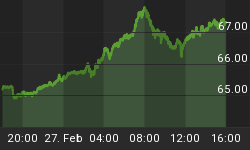The federal budget deficit reached its widest gap on a 12-month moving total basis in February 2010 at $1.478 trillion. Although remaining at astronomical levels, the budget deficit has been trending lower and stood at $1.246 trillion in March 2012. The year-over-year growth in the 12-month moving total of federal outlays peaked at 19.7% in July 2009. In March 2012, the year-over-year change in the 12-month moving total of federal outlays was minus 1.1%. The median growth in the year-over-year moving total of federal outlays from December 1955 through March 2012 is 6.6%. Starting in March 2010, growth in federal outlays has been below the long-term median. The year-over-year change in the 12-month moving total of federal receipts reached a nadir of minus 17.6% in November 2009. In March 2012, the year-over-year growth in the 12-month moving total of federal receipts was 5.4%. The median growth in the year-over-year 12-month moving total of federal receipts from December 1955 through March 2012 is 7.4%. Starting in September 2011, growth in federal receipts has been below the long-term median. It would appear that what accounts more for the persistence of large federal deficits is weak growth in receipts rather than strong growth in expenditures.

Paul L. Kasriel, post April 30, econtrarian@gmail.com















